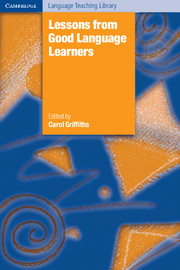Book contents
- Frontmatter
- Contents
- List of contributors
- Acknowledgements
- Editor's overview
- Prologue
- Reflections
- Part I Learner variables
- 1 Motivation and good language learners
- 2 Age and good language learners
- 3 Learning style and good laguage learners
- 4 Personality and good language learners
- 5 Gender and good language learners
- 6 Strategies and good language learners
- 7 Metacognition and good language learners
- 8 Autonomy and good language learners
- 9 Beliefs and good language learners
- 10 Culture and good language learners
- 11 Aptitude and good language learners
- Part II Learning variables
- The learners' landscape and journey: a summary
- Index
2 - Age and good language learners
Published online by Cambridge University Press: 11 August 2009
- Frontmatter
- Contents
- List of contributors
- Acknowledgements
- Editor's overview
- Prologue
- Reflections
- Part I Learner variables
- 1 Motivation and good language learners
- 2 Age and good language learners
- 3 Learning style and good laguage learners
- 4 Personality and good language learners
- 5 Gender and good language learners
- 6 Strategies and good language learners
- 7 Metacognition and good language learners
- 8 Autonomy and good language learners
- 9 Beliefs and good language learners
- 10 Culture and good language learners
- 11 Aptitude and good language learners
- Part II Learning variables
- The learners' landscape and journey: a summary
- Index
Summary
The role played by age in the development of language by those who already speak other languages (SOL), and the relationship between age and other learner variables such as motivation and aptitude are hotly debated issues. Opinions are divided, sometimes sharply so, over the extent to which the age of the student affects language development, and research aimed at providing evidence for one point of view or another has frequently yielded conflicting results which, often as not, have merely added to the controversy. Although, according to Hyltenstam and Abrahamsson (2003, p. 539), “both the entirely successful adult learner and the slightly unsuccessful child deviate from the unspoken norm”, according to Marinova-Todd, Bradford Marshall and Snow (2000), the younger-is-better notion may be a result of misinterpretation of the facts, misattribution of causality and misemphasison poorer adult learners while underemphasizing good older learners.
The evidence so far
In one of the earliest studies into age-related differences in language development by speakers of other languages, Oyama (1976) studied 60 Italian-born immigrants to the USA. Tape recordings were made of them reading aloud and telling an unrehearsed story. Later they were judged on a five-point scale from no foreign accent to heavy foreign accent. The results indicated that the younger people were when they started learning English the more native-like was their pronunciation. Other studies have shown that, although younger learners are often more successful in the long run, adults may learn more quickly initially.
- Type
- Chapter
- Information
- Lessons from Good Language Learners , pp. 35 - 48Publisher: Cambridge University PressPrint publication year: 2008
- 7
- Cited by



